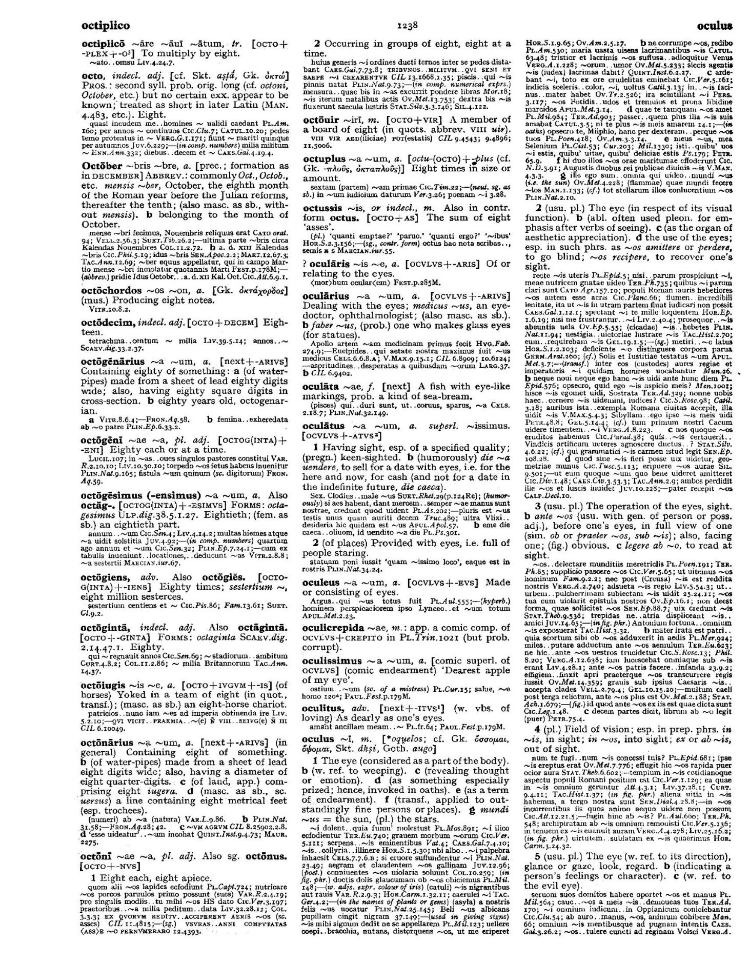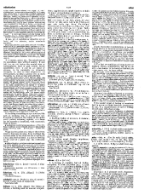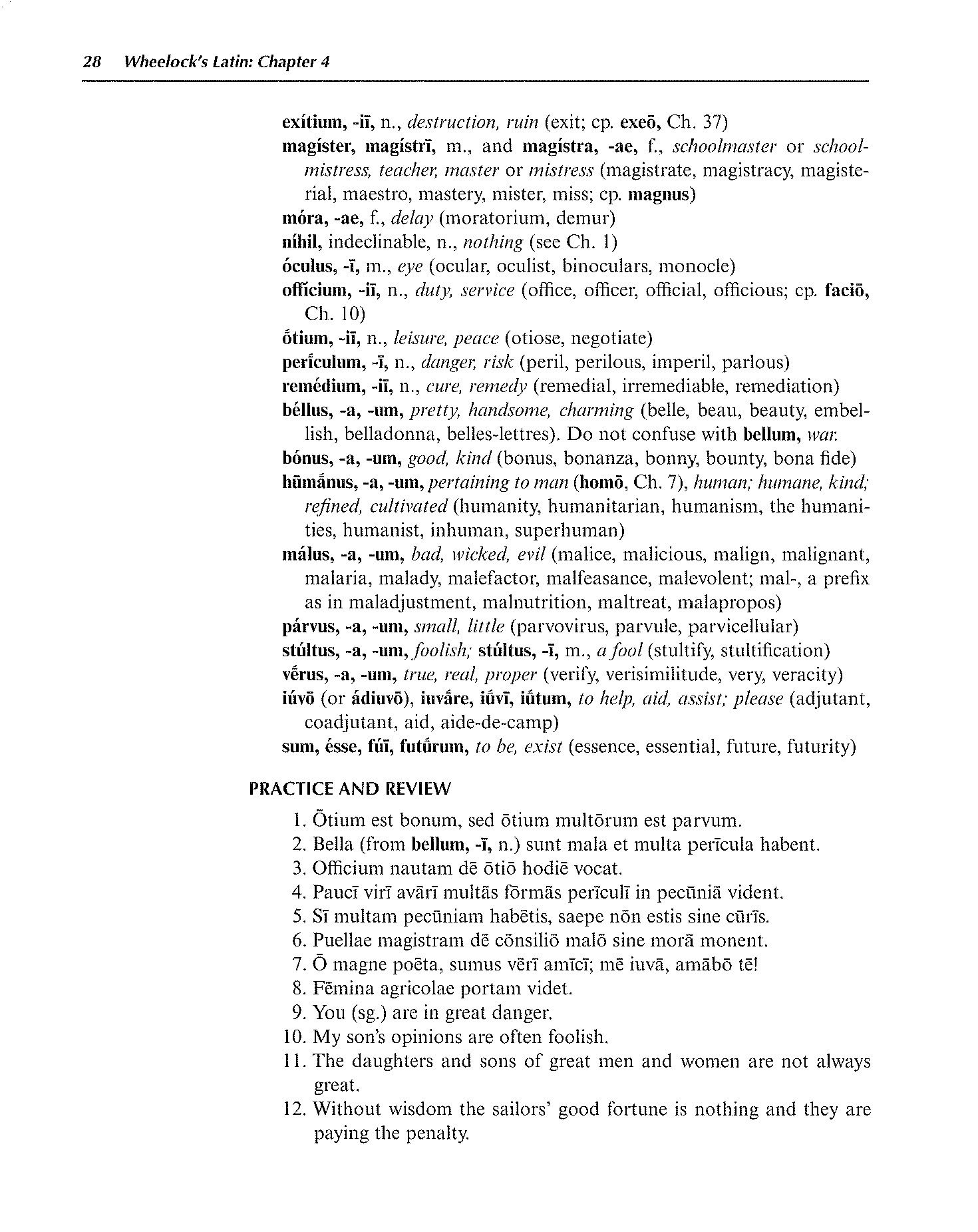
page_listing.tpl
page_subListingDetails.tpl
sub_listingDetails_style1.tpl
sub_listingDetails.title.tpl
oculus eye
oculus is a Latin Noun that primarily means eye.
Definitions for oculus
Wheelock's Latin
Noun
- 1
eye
English derivatives:
ocular oculist binoculars monocle
Oxford Latin Dictionary
Noun
- 1
The eye (considered as a part of the body). (b) (w. ref. to weeping). (c) (revealing thought or emotion). (d) (as something especially prized; hence, invoked in oaths). (e) (as a term of endearment). (f) (transf., applied to outstandingly fine persons or places). (g) the sun, (pl.) the stars.
- 2
(usu. pl.) The eye (in respect of its visual function). (b) (abl. often used pleon. for emphasis after verbs of seeing). (c) (as the organ of aesthetic appreciation). (d) the use of the eyes; esp. in such phrs. as to go blind; to recover one's sight.
- 3
(usu. pl.) The operation of the eyes, sight. (b) (usu. with gen. of person or poss. adj.), before one's eyes, in full view of one (sim.); also, facing one; (fig.) obvious. (c) to read at sight.
Sentences with oculus
Latin to English
Id meīs oculīs vīdī.Compare I saw it with my own eyes.
Sine oculīs vīta est nihil.Compare Life is nothing without eyes.
Artem Graecōrum oculīs meīs vīdī.Compare I have seen the art of the Greeks with my own eyes.
Video, Patres conscriptus, in ego omnis os atque oculus converto.Compare I see, conscript Fathers, that the faces and eyes of all are turned on me.
Nemo vos sum, qui non ante oculus ipse saepe militaris aliqui edo facinus.Compare There is not one of you, before whose eyes I have not myself often performed some military exploit.
Declension table for oculus
Cactus2000
| Singular | Plural | |
| Nom. | oculus | oculī |
| Gen. | oculī | oculōrum |
| Dat. | oculō | oculīs |
| Acc. | oculum | oculōs |
| Voc. | ocule | oculī |
| Abl. | oculō | oculīs |
Data sources
Notes
- Definitions
- Frederick M. Wheelock, Wheelock's Latin, 6th ed., rev. Richard A. LaFleur (New York, NY: HarperCollins Publishers, 2005): 28.
- P. G. W. Glare, Oxford Latin Dictionary, Vols. 1-8 (Oxford: Clarendon Press, 1982): 1238.
- Word frequencies
- Christopher Francese, "Latin Core Vocabulary," Dickinson College Commentaries, last modified 2014, http://dcc.dickinson.edu.
- Paul B. Diederich, The Frequency of Latin Words and Their Endings, PhD diss., (Columbia University, 1939).
- Louis Delatte, Suzanne Govaerts, Joseph Denooz, and Etienne Evrard, Dictionnaire fréquentiel et index inverse de la langue latine [Frequency Dictionary and Inverse Index of the Latin Language] (Liège, Belgium: Laboratoire d'analyse statistique des langues anciennes de l'Université de Liège [L.A.S.L.A.], 1981): 120.
Bibliography
Allen, Joseph H. Allen and Greenough's New Latin Grammar for Schools and Colleges: Founded on Comparative Grammar. Edited by James B. Greenough, George L. Kittredge, Albert A. Howard, and Benjamin L. D'Ooge. Boston, MA: Ginn & Company, 1903.
Crystal, David. A Dictionary of Linguistics and Phonetics. 6th ed. Oxford, UK: Blackwell Publishing, 2008.
Delatte, Louis, Suzanne Govaerts, Joseph Denooz, and Etienne Evrard. Dictionnaire fréquentiel et index inverse de la langue latine [Frequency Dictionary and Inverse Index of the Latin Language]. Liège, Belgium: Laboratoire d'analyse statistique des langues anciennes de l'Université de Liège (L.A.S.L.A.), 1981.
Diederich, Paul B. The Frequency of Latin Words and Their Endings. PhD diss., Columbia University, 1939.
Francese, Christopher. "Latin Core Vocabulary." Dickinson College Commentaries. Last modified 2014. http://dcc.dickinson.edu/latin-vocabulary-list.
Gildersleeve, Basil L., and Gonzales Lodge. Gildersleeve's Latin Grammar: Third Edition, Revised, and Enlarged. 3rd ed. London, England: Macmillan and Co., 1903.
Glare, Peter G.W. Oxford Latin Dictionary. Vols. 1-8. Oxford, England: Clarendon Press, 1982.
Krüger, Bernd. "Latin Conjugation Tables." Cactus2000. Accessed May 5, 2023. https://latin.cactus2000.de/index.en.php.
Pierson, Nick. "Sound of Text." Accessed October 26, 2019. https://soundoftext.com.
Wheelock, Frederick M. Wheelock's Latin. 6th ed. Revised by Richard A. LaFleur. New York, NY: HarperCollins Publishers, 2005.
Wiktionary Contributors. "Victionarium." Wikimedia Foundation, Inc. Updated March 18, 2019. https://la.wiktionary.org/wiki/Victionarium:Pagina_prima.
Citation
Chicago (17th ed.)
Allo Contributors. "oculus, oculī (n.) - Latin Word Definition." Allo Latin Dictionary. Last modified . Accessed February 19, 2026. http://ancientlanguages.org/latin/dictionary/oculus-oculi.
Entry created on . Last updated on .








